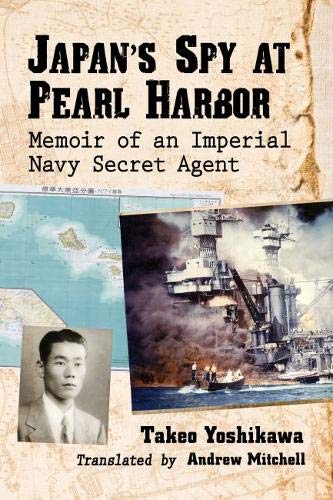Japan’s Spy at Pearl Harbor: Memoir of an Imperial Navy Secret Agent
Takeo Yoshikawa
 The December 7th, 1941 attack on Pearl Harbor was the culmination of a long-term plot by Imperial Japan during World War II. Naval officer and imperial spy Takeo Yoshikawa played a pivotal role in this endeavor, sending military intelligence reports from Pearl Harbor to Japanese headquarters through the Consulate-General in Honolulu. Over his career being stationed in Hawaii, Yoshikawa sent over a hundred cables back to his government reporting on United State military instillations and equipment. After the war, Yoshikawa wrote of his involvement in the attack in an article, eventually leading him to appear in a film about his experience. However, he published his complete memoir in 1963 and it is presented here for the first time in English, translated by Andrew Mitchell. Mitchell brings this little-known spy to the for front of the American reader’s mind in Japan’s Spay at Pearl Harbor: Memoir of an Imperial Navy Secret Agent.
The December 7th, 1941 attack on Pearl Harbor was the culmination of a long-term plot by Imperial Japan during World War II. Naval officer and imperial spy Takeo Yoshikawa played a pivotal role in this endeavor, sending military intelligence reports from Pearl Harbor to Japanese headquarters through the Consulate-General in Honolulu. Over his career being stationed in Hawaii, Yoshikawa sent over a hundred cables back to his government reporting on United State military instillations and equipment. After the war, Yoshikawa wrote of his involvement in the attack in an article, eventually leading him to appear in a film about his experience. However, he published his complete memoir in 1963 and it is presented here for the first time in English, translated by Andrew Mitchell. Mitchell brings this little-known spy to the for front of the American reader’s mind in Japan’s Spay at Pearl Harbor: Memoir of an Imperial Navy Secret Agent.
The memoirs were written by Yoshikawa, himself, and later in life. As such, he writes with a tone of explaining his actions, sometimes even apologetically. The book is written starting with how he learned self-discipline and focus from knife throwing and an adherence to a strict exercise routine from his father, all leading him to a life in the military and eventually espionage. He also includes a letter from a US Army pilot of who was at Hickman Field in Hawaii on the day of the attack. He uses this letter to introduce the explanations of all the steps that would lead him to that infamous day.
Yoshikawa provides interesting anecdotes and important information about Japanese military operations in the early twentieth century. First, he provides descriptions of the selection process for the Naval Academy, as well as their training and culture. He notes the academy’s long-standing traditions, “passed down through the generations,” (p.25). The academy also engrained in him his sense of patriotism and duty. Other anecdotes especially useful for military researchers is his story of the “thunderous boom,” (p.149). On the day of the attack Yoshikawa heard a large boom that he attributes to the success of a sing-manned special submarine from Japan. Though the success of these subs has been refuted by the United State, the Japanese government disagrees. Yoshikawa’s first-hand account, first presented here in English, could provide valuable insight into this debate.
There are often times are a translator’s note would be helpful. In the beginning section he is discussing his brother’s dietary restrictions. Though he explains it as a “strange food allergy” (pg. 20.) but later in the same paragraph he say that his parents went through every effort to make him eat them, which would align with a food aversion rather than an allergy. This curious paragraph seems like a confused word choice that might have be worthy of a translator’s note. Otherwise, Mitchell’s notes provide helpful historic and cultural context to the reader, anchoring them in their moments in time.
- Translated by Andrew Mitchell
- Jefferson: McFarland & Company, 2020
- 6” x 9”, softcover, vii + 299 pages
- Photographs, notes, index. $21.99
- ISBN: 9781476676999
Reviewed by: Traci Andrews, Texas A&M University
